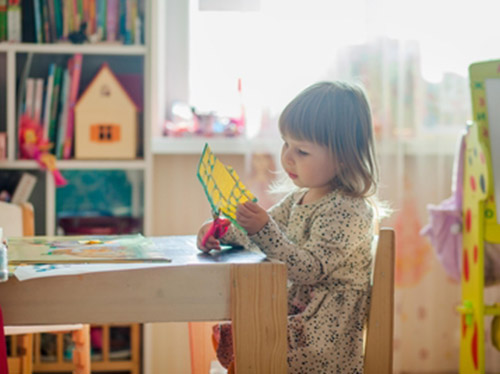
In Montessori education, the culmination of early childhood learning is the kindergarten stage, and later, a successful transition into the elementary program. Dr. Maria Montessori designed the primary program this way, creating a three-year process where children ages three to six stay with the same teacher in the same classroom. The third year, the kindergarten year, becomes a vital period when all of the past year’s experiences reach fruition, and a student’s deeper learning begins to come together.
So, what can students expect to learn when entering a Montessori school at the kindergarten age? When they reach this stage, the expectations and privileges in the classroom increase, and kindergarteners are encouraged to take on more complicated work. As with the Montessori curricula, the kindergarten stage is designed to develop the social, emotional, cognitive, and physical development of the child.
Cognitive Growth
Cognitive development happens in many ways for a child entering a Montessori kindergarten program. Students work on their language skills through lessons on reading comprehension, spelling, and writing. Practicing verbal speech skills is also supported through the integrated curriculum.
Students’ cognitive ability also progresses through practicing new math concepts including numeration, place value, and mathematical operations. Kindergarteners even dabble in concepts of physical science, geography, history, music, food, and art from around the world.
Social and Emotional Education
The Montessori curriculum places great emphasis on the social-emotional growth of the child at all levels, but especially at the kindergarten stage. At the kindergarten level, students are introduced to the concepts like grace and courtesy and are taught to show respect and kindness to their classmates and their environment. At the same time, kindergarteners are learning to understand and manage their own emotions, making notes of when they feel positive and when they are not.
Furthermore, one of the most significant takeaways from early childhood Montessori education is the ability to focus. Kindergarten students are asked to work with others and independently, and so autonomous concentration is a skill that helps the child in the long run since it is the foundation of lessons and play alike.
Physical Development
In the time leading up to the kindergarten year, young students are developing the physical mastery required to succeed in the next level of their schooling. Kindergarteners are learning and practicing the dexterity skills needed to manipulate writing utensils, paint brushes, scissors, and so on, allowing them independence when it comes to writing and drawing. Montessori kindergarten classrooms encourage students to work on these physical skills, helping them to generally understand the way their body interacts with their environment.
Overall, although the Montessori philosophy allows for some differences in the curriculum from classroom to classroom, every Montessori kindergarten student will learn to focus on their cognitive development across a wide range of subjects, social and emotional learning, as well as physical growth. At the kindergarten level, Montessori students learn how to control themselves and their emotions, as well as how their actions impact others around them. After this essential stage in their growth, kindergarten Montessori students are prepared to move on to the elementary curriculum in a Montessori program.
The Montessori Charter School of Flagstaff was the first school in Arizona to have its application for a charter approved by the Arizona State Board for Charter Schools. We offer an academic program that identifies and encourages each child’s individual social and emotional development. Visit our blog to learn more about our method or reach out today to begin your journey with The Montessori Charter School of Flagstaff.
